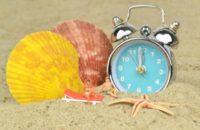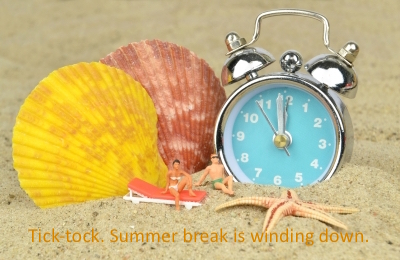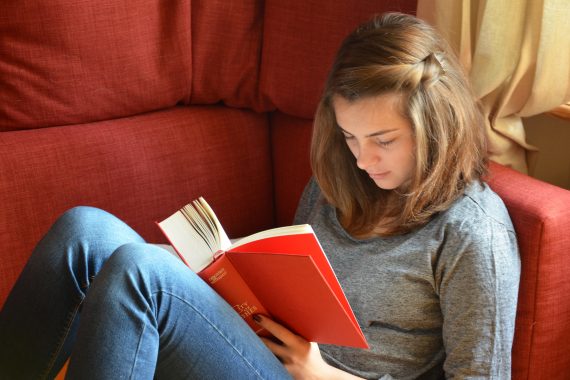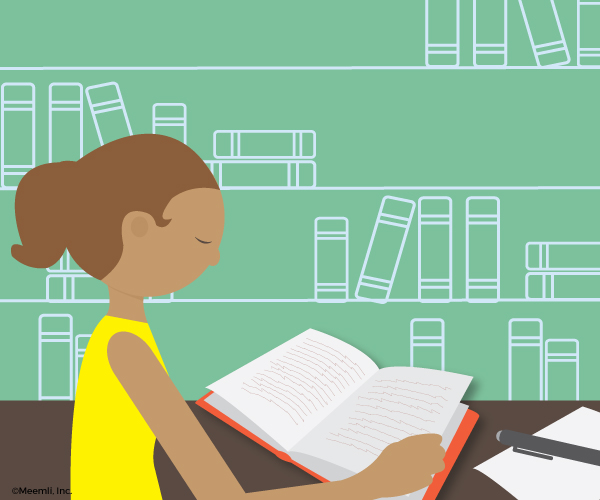Tag: reading
A Teacher’s Tip for Back to School: Start Reading!

(A teacher’s perspective and another favorite of ours!)
Sleep in. Stay up late. Play video games…all day.
According to my high school students, they’d like to spend their summer vacation. Now, the reality may be different (parents?), but the freedom and possibility that summer represents to children – to all of us – is very real. Another very real thing: back to school has kicked off around the country.
But luckily, the freedom and possibility that make us love summer can also help your child successfully transition back to school, reading, perhaps even with a greater appreciation for it.
Why Read
If you found your way to this blog, fantastic! You are probably already convinced of the importance of reading for academic success. And mountains of research back you up. A Department of Education study assures us that families play a big role because the amount of reading done outside of school can greatly impact a student’s success in school.
Unfortunately, academic skills often decline over the summer. If your child has read nothing but tweets and fortune cookies all summer (ok, it happens), they might have begun a trip down the summer slide. But don’t panic. You still have time to get them back on track.
How To Read
In short: build stamina. From my experience, the first couple of weeks of school doesn’t pass without at least a couple students reminding me that my 8:45 English class is happening at least a couple hours before they’re supposed to be awake. But teachers often expect kids to hit the ground running. So begin to help your child find a reading routine. The reading requirements that are awaiting them in English class, social studies, science, economics, etc. will be much easier if your child is already accustomed to reading daily.
Now, if your child hasn’t been reading consistently this summer, start small. Fifteen minutes is probably about right for a middle or early high school student. They can do it. They will build from here, to 20, 25 even 30 minutes. Wouldn’t it be wonderful if your child started this school year reading 30 minutes daily? This is probably one of the most important things that you, as a parent, can do to support your child’s success in school this year.
What To Read
As a teacher, I have asked a student what he or she like to read and been told, “I dunno” innumerable times. Ah, yes. Often, behind the sullen, frustrated or bored tone is a child who genuinely doesn’t know what he or she likes to read. Don’t give up if you get this response!
I’ve found great success asking students about their favorite TV shows or movies and tying them to genres and books. Fans of Walking Dead can Google “young adult (YA) zombie novels.” Is Gossip Girl their thing? Run a search: “books like gossip girl.” Jurassic World? Ender’s Game? Hey, these two were originally books, so that’s easy! (Also, your local librarians would love to help your child find a book. They live for these moments.)
Don’t be disappointed if your child isn’t interested in “important authors” like Shakespeare, Hawthorne or Melville. That’s what school is for. Generally, in class, your child will be reading more difficult texts that are not easy to relate to or understand. Independently, your child should be able to choose. Shakespeare’s great, but he’s not at the top of my personal summer reading list either.
Remember, it doesn’t matter if you want to read this book or not. It matters that they do.
Where To Find Resources
Time to tap the Internet. There are many great online resources that can help your child become a better reader (I could do a whole post on them) and here are some good ones to get started.
Check out YourNextRead.com which features long lists of “to read” books for many of my students who “don’t like to read.” GoodReads.com also has hundreds of lists of books for every taste.
Then there are the sites with high-quality content, especially non-fiction, aimed at middle and high schoolers, here are a few:TeenInk (written by teens), NY Times Learning Network, Smithsonian’s TweenTribune.
Final Tips
It’s a simple thing, but reading logs can be a great motivator. From reluctant readers to bookworms, reading logs satisfy. It’s just gratifying to see how much you’ve read. You can find printables online, or simply keep track of the basic info on a piece of notebook paper: book title, start/end pages, and amount of time read. Do what seems most motivating for your child.
Discuss the books with your child to help develop deeper understanding – ask about the main idea, the plot, the characters, what the author is trying to achieve etc. (Think your child may need help with reading or writing? Check out free reading and writing assessments on Meemli Academy or just contact Meemli.)
And my favorite: read with them. Can you find fifteen minutes to actually sit down and read too? The most successful reading program I’ve ever experienced was at a school that had daily reading time during which the teachers were also required to drop everything and read. No email, no grading, no lesson planning, just read for pleasure. It was transformative for everyone. You can be a role model and inspire your child to read by doing it yourself.
What are your tips to get your kids reading? We’d love to hear them!
30 Aug, 2019
The Summer Break Is Winding Down

(Parents may help their younger kids with this!)
For many students, the summer break may soon be ending with schools scheduled to re-open over the next few weeks. And the thought of winding down the summer and getting ready for school could cause anxiety and stress, enough to put a damper on the last few days/weeks of summer fun.
Much of the stress is due to simply not being prepared – not being prepared for the summer break to end and school to begin. Have you got what you wanted out of summer? Have you done what you need to make going back to school easier? It’s enough to make any student (and their parents!) feel tense enough to almost wipe out all the benefits of the summer break.
 Image courtesy: Mister GC/FreeDigitalPhotos.net
Image courtesy: Mister GC/FreeDigitalPhotos.net
Here’s a low stress guide to easing yourself back to the “school mode” while still getting the most out of your summer. Kick back, relax, and take a couple of minutes to learn how to take the stress out of the last few days of summer.
Assignments
You probably have some “homework” assigned that you’re expected to turn in when school reopens. And it’s going to weigh you down as long as it is still a “to-do”. Aim to get it done now, so you’re not scrambling on the last day of your break.
Almost everyone has “summer reading” requirements, which often involves more than one book. Haven’t started your reading yet? It is not too late! Want to check your reading comprehension skills? Check them out here and if you’d like some help, we can help – get in touch!
Supplies
Though technology has made huge inroads in education, we’re still not a time when you can go to school just with a laptop or tablet. If you want to make sure you get what you want, not just what’s left over and available, make time to figure out what you need and go get it so you can check it off your list. Somehow seeing a stack of notebooks and ruled paper subliminally puts you in the mood for school.
And though they’re not technically “supplies”, now’s a good time to think of clothes, shoes, athletic gear and anything else you may want for the next school year. (Fun fact: teens spend 40% of their money on clothing!) While you may not want to go overboard and get everything now (it may be smart to wait until school starts to find out what you really need and want), it will be a relief to have what you need handy instead of burrowing through your laundry basket on the first day of school.
Memories
Was there something special you really wanted to do just for yourself this summer? Learn to play a song, or master some dance moves, get in touch with someone you really care about, have an amazing day with your best friends, cook something special for your grandma – something that would make you feel good about yourself? Even if you have only a few days left, make time to do that special thing. Make your summer memorable (and take pictures!) in a way that matters to you. It will not only help you start the new school year with an emotional boost, it will give you memories you’ll cherish for many years to come.
Need Help With Essays?
Get personalized feedback from a Stanford-trained educator on any personal essay that’s critical to you.
Related Posts:
Now that’s a simple enough to-do list isn’t it? It’s based on the proven concept that choosing preparation over worrying beats stress, and everything on this list is something you can plan for, and get done, to your own schedule.
Summer break’s winding down and the school year’s almost here, but with a few easy actions you can enjoy both!
30 Jul, 2019
Winners’ Tip: Read More
Not everyone enjoys reading. For some, reading for an assignment seems a tiresome, boring, or even stressful, chore, and being asked to “read more” doesn’t at all sound worthwhile.
But reading is one of the most useful skills you can have, and being a competent reader can help you succeed in many arenas in life. Fortunately, it’s easy to improve your reading abilities, because all you have to do is read more, and then some more again, and soon you’ll see the benefits of reading.
Here’s why you should take the trouble to read more than just what is required at school.

Win At School
If you’re in middle school or high school, you’re probably already well aware of the amount of reading you have to do for school. And if you’re not into reading, maybe you’ve been scraping by with the bare minimum of reading so far, or opting for SparkNotes from time to time (we’ve all done it!).
Trust us, reading more will help you out and here’s some data to prove it! Increasing the amount of reading you do can also work wonders for your reading comprehension, whether it’s literature or a social studies text or a science article. Reading more often can quickly help you read faster, improve your vocabulary and build critical thinking skills, which can cut down the amount of time you spend on homework each night.
Win At College
While reading assignments might be a common feature of your high school experience, college is a time where reading is really taken to the next level. The amount of reading you’ll likely have to do simply to keep up with your classes escalates dramatically – even if you’re not a liberal arts major. The things you’ll be reading about can be more complex than you’re used to, and you might be reading about things you’ve never even heard of.
College readings can take you a bit more time to digest and fully understand, so reading more often can help you develop your ability to process lots of information. Reading a lot also helps you develop your writing skills, which will almost inevitably come in handy as you’re writing your college papers. By practicing your reading, you’re setting yourself up for success in higher education and beyond.
Win At Your Job
As we already mentioned, reading more often can improve greatly improve your critical thinking skills, which will be definitely be an asset in any career you end up choosing. In addition, the link between more reading and better writing isn’t just useful for college papers; writing is an integral part of almost any job. Reading can help you clearly and concisely convey your thoughts in writing, a soft skill with immense importance in the professional world. Even engineers have to write professional emails, right?
And, to make it even more worthwhile, there are many excellent jobs that reward people with good reading skills, so if you read more, you’re also increasing your job opportunities!
Win At Life
In general, reading exposes you to new ideas and broadens your horizons. By increasing the amount of reading material that you consume, whether it is fiction or nonfiction, you’ll be exposed to a variety of viewpoints surrounding the same issue, which can help you develop your own informed opinions – not just blindly accept what you read or hear. Equally, this kind of exposure can help you develop new interests, or even allow you to take a deeper dive into the things you already know you’re interested in. Hone your ability to search for new information, or even ask others for their reading lists to keep you engaged and interested.
Reading has also been shown to make you a better person in many different ways, and a smarter one too. All of this will help you win not only at school and work, but also at life – and who wouldn’t want that?
Our recommendation is that you start by carving out some time every day to do a little extra reading. Pick books that will interest you (here are some ideas to get started), and soon you’ll find yourself wanting to read more. Enjoy!
14 Mar, 2018
Summer Reading Books For Teens
As your break gets into full swing, make sure you have your “summer reading books” picked out. Why read during summer? First, you probably have some required reading assigned to you at school so it may not be optional. Also reading improves your life, including helping you fill some boring hours – and we all have them, even during perfect summers. Best of all, reading is fun, especially when you get to pick the books!

Here are some books recommended by our teachers which may interest high-schoolers and advanced middle-schoolers too. These are a little out of the ordinary and may be good choices as summer reading books and “pick your own book” reading programs.
Please click on the name to check the description of the book, and if necessary, discuss with your school and parents, to ensure it is an appropriate choice for you.
Fresh and Uncommon Reads
Non-Fiction
Shane Burcaw, Laughing at My Nightmare
James Hirsch, Hurricane: The Miraculous Journey of Reuben Carter
Martin Pistoris, Ghost Boy
Steve Sheinkin, Lincoln’s Grave Robbers
Deborah Heligman, Charles and Emma: The Darwins’ Leap of Faith
Maya Van Wagenen, Popular
Agnieszka Biskup & Tammy Enz, Batman Science: The Real-World Science Behind Batman’s Gear
Graphic Novels
Gene Luen Yang, American Born Chinese (13+)
Alexander Lagos, Sons of Liberty (10+)
Doug, TenNapel, Ghostopolis (10+)
Raina Telgemeir, Smile (14+)
Gene Luen Yi, Level Up (14+)
Emily Carroll, Through the Woods(14+)
Marjane Satrapi, Persepolis (16+)
Middle Level Reading
Kelly Fiore, Just Like the Movies
Megan Shull, The Swap
Lauren Morrill, Being Sloane Jacobs
Firoozeh Dumas, It Ain’t So Awful, Falafel
Jason Reynolds, As Brave as You
Kwame Alexander, The Crossover
Up All Night Reads
Frances Hardinge, The Lie Tree
Alex London, Proxy
T.L. Costa, Playing Tyler
Michael Grant, Gone
E.L. Lockhart, We Were Liars
Maggie Stiefvater, The Scorpio Races
Oh, What a World
M.T. Anderson, Feed
Joelle Charbonneau, The Testing
Sally Gardner, Maggot Moon
Patrick Ness, The Knife of Never Letting Go
Mark Frost, The Paladin Prophecy
Ernest Cline, Ready Player One
Exploring the Unusual
Laura Ruby, Bone Gap
Robin Sloane, Mr. Penumbra’s 24-Hour Bookstore
Chitra Banerjee Divakaruni, Mistress of Spices
Cath Crowley, Graffiti Moon
Kate Hattemer, The Vigilante Poets of Selwyn Academy
Leslye Walton, The Strange and Beautiful Sorrows of Ava Lavender
Max Barry, Lexicon
This summer we hope you’ll join us in savoring the new worlds, people and ideas in books and relishing the joy of reading.
There are many more new and interesting books out there. If you have favorites you’d like to recommend, leave us a reply – Happy Summer Reading!




